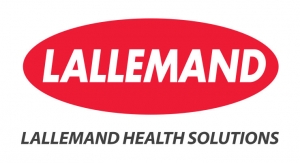Romane Maillet, Product Manager, Lallemand Health Solutions, discusses the company’s new organic version of its property yeast Saccharomyces boulardii to celebrate the 100th anniversary of its discovery. An edited transcript follows below.
Sean Moloughney, Editor of Nutraceuticals World (NW): Can you tell us about your new organic Saccharomyces boulardii and its main health applications?
Romane Maillet, Product Manager, Gut Health, Lallemand Health Solutions: Lallemand Health Solutions is launching this first and unique organic version of probiotic yeast Saccharomyces boulardii to celebrate the 100th anniversary of its discovery because it was discovered in 1923. This new and innovative positioning for S. boulardii will create new opportunities, particularly for consumers looking to make more conscious buying choices.
Since a century now, used as dietary food and supplements, probiotic yeast S. boulardii remains the most widely studied yeast for its gut health benefits. It has been documented in over 100 clinical studies and showed it could help support several gastrointestinal conditions such as prevention of antibiotic-associated diarrhea or traveler’s diarrhea and intestinal disorders due to C. difficile and H. pylori [Hosjak 2018]. S. boulardii is a safe and reliable probiotic yeast suitable for both children and adults.
NW: What makes organic S. boulardii unique in today's market? What are the competitive advantages as compared to traditional, non-organic probiotic strains?
Maillet: Organic S. boulardii is the only probiotic available as a pure organic ingredient for use in organic certified dietary supplements. According to FMCG Gurus survey, 48% of global consumers are ready to spend more money for an organic product most of the time or all the time. Additionally, the same survey showed that 37% of global consumers state the claim “organic” is important when buying nutritional supplements. So that's why here we are offering a pioneering solution in line with the market trend.
Because it is a yeast, it belongs to the vegetal reign so it can grow from organic agricultural nutrients, so it is the only probiotic that can be organically certified. It gives organic S. boulardii a competitive edge when compared to probiotic bacteria. From seed to shelf, promoting organic agriculture means also promoting communities’ health by safeguarding biodiversity and by protecting local environment and their inhabitants.
NW: What are the technical differences between organic espada and other probiotic strains?
Maillet: It is a living microorganism, so organic S. boulardii is produced with carefully selected organic raw ingredients. Therefore, the manufacturing conditions are adapted and optimized to ensure the probiotic’s viability and efficacy.
NW: Can you discuss the significance of organic certification?
Maillet: The process to be certified as organic supplier and be able to supply pure organic ingredients is a very rigorous and demanding process that Lallemand achieved successfully. Throughout the whole organic certification process, supply-chain transparency and consumers’ confidence are ensured by a rigorous third-party verification program following European organic regulation.
NW: Is your organic probiotic solution ready to be commercialized at this point?
Maillet: Yes, our organic S. boulardii is ready for the market. At first, it will be available as powder as a pure organic ingredient for use in organic dietary supplements. Our research and development team has done all the necessary pilot-scale tests to ensure a shelf-life stability of 24 months at 25° Celsius with a concentration set at 20 billion CFU/gram.













